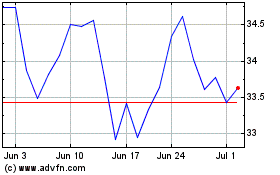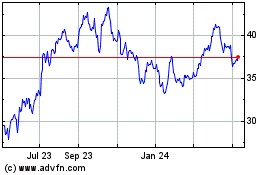Halliburton Swings to Loss but Signals Upturn -- Update
July 20 2016 - 12:03PM
Dow Jones News
By Anne Steele and Alison Sider
Halliburton Co. swung to a loss in its latest quarter as it
booked hefty charges related to its failed tie-up with Baker Hughes
Inc.
Still, results came in better than anticipated for the second
largest oil-field-services company behind Schlumberger Ltd., and
the industry bellwether emphasized that the North American oil
industry is poised for a turnaround in the second half of the
year.
Halliburton shares fell 1.1% to $44.49 Wednesday morning.
Halliburton reported a loss of $3.21 billion, or $3.73 a share,
for the period ended June 30, compared with a year-earlier profit
of $54 million, or 6 cents a share. Excluding special items, the
company posted an adjusted loss from continuing operations of 14
cents a share. Total revenue slid 35% to $3.84 billion.
Analysts polled by Thomson Reuters had projected an adjusted
loss of 19 cents a share on $3.75 billion in revenue.
Halliburton said revenue in its North American operations -- the
largest contributor to its top line -- tumbled 43% amid reduced
activity throughout the U.S. land sector, particularly pressure
pumping services and drilling activity.
But Halliburton Chief Executive Dave Lesar cited a more positive
climate for the remainder of the year, saying an emotional
threshold was crossed when oil prices hit $50 per barrel during the
quarter. Though they've slid some since then to $44.65 Tuesday, oil
companies are starting to think about growing rather than just
hanging on.
"There's a spring in their step I didn't see earlier in the
year," Mr. Lesar said of Halliburton's customers. "In short, they
are getting back to business."
The company believes the U.S. rig count bottomed out during the
quarter, pointing out that it has improved by 26 over the past
several weeks, reflecting operator confidence in stabilizing
commodity prices. Mr. Lesar said he expects a "modest uptick" in
the rig count during the second half of the year and a more
significant ramp up in 2017.
Some of the pain from nearly two years of low oil prices will
linger. Oil-field services companies made deep pricing concessions
at the depths of the downturn, idling equipment and laying off tens
of thousands of workers.
Mr. Lesar cautioned that the exploration and production
companies will have to adjust to paying more for work from drillers
and frackers if they expect the services providers to stay in
business.
"They know in their heart of hearts that service prices have to
go up," he said.
In May, Halliburton and Baker Hughes called off their merger,
which was once valued at nearly $35 billion, after the companies
had faced intense regulatory pressure on several continents. They
had struck the deal in 2014, but it had appeared especially
troubled since April, when the Justice Department filed a lawsuit
to block it.
The company booked $3.52 billion of costs related to terminating
the Baker Hughes deal, as well as $423 million of other impairments
and charges during the quarter.
Write to Anne Steele at Anne.Steele@wsj.com and Alison Sider at
alison.sider@wsj.com
(END) Dow Jones Newswires
July 20, 2016 11:48 ET (15:48 GMT)
Copyright (c) 2016 Dow Jones & Company, Inc.
Halliburton (NYSE:HAL)
Historical Stock Chart
From Mar 2024 to Apr 2024

Halliburton (NYSE:HAL)
Historical Stock Chart
From Apr 2023 to Apr 2024
